
This week's Sepia Saturday photo of a group of intrepid adventurers posing at the entrance to a limestone cave system in New South Wales gives me an opportunity to make a return visit to Dovedale in the English Peak District, which I have featured a couple of years ago: Donkey Rides at Dovedale and The Compleat Angler, a Derbyshire Fishing Trip.
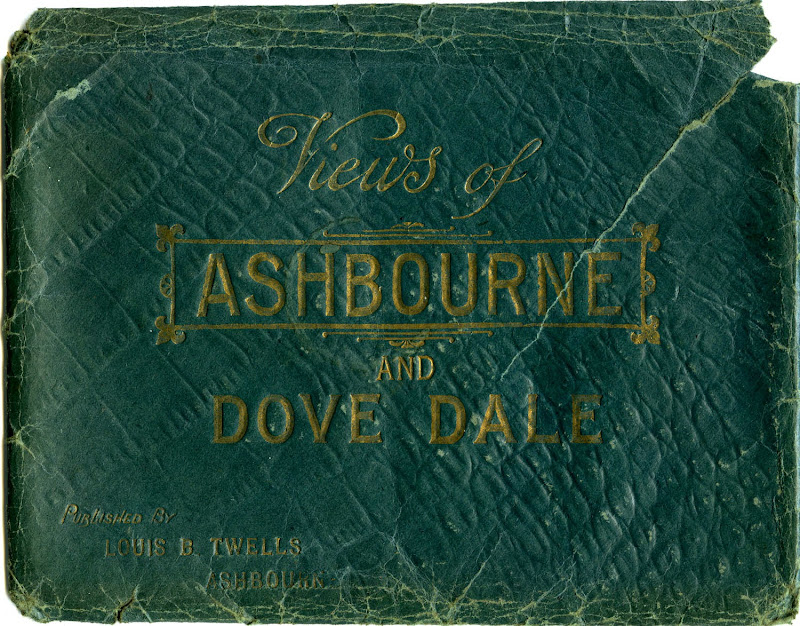
Views of Ashbourne and Dove Dale
Published by Louis B. Twells, Ashbourne
This time I can use a couple of more recent acquisitions, purchased for very modest sums on eBay. The first, a large envelope made of green paper with a shiny, faux crocodile skin finish and gold print, contains 32 black-and-white and blue-tinted lithographic prints, each measuring approximately 205 x 151mm (8" x 6"). The title on the envelope simply states, "Views of Ashbourne and Dove Dale" - which indeed they are - published by Louis B. Twells of Ashbourne.
Louis Bosworth Twells (1829-1885) settled in Ashbourne (Derbyshire) around 1855, and over the next three decades conducted a variety of trades: hair cutter/dresser, perfumer, jeweller, silversmith, watch maker, importer of general fancy goods, sponges, &c., and proprietor of "large show rooms for glass, china, and earthenware." I have seen a single example of a carte de visite portrait which he also "published." There is no direct evidence that he took any photographs himself, but he may well have done. After his death in 1885 his widow and son, also named Louis B. Twells, continued to operate the business until 1903.
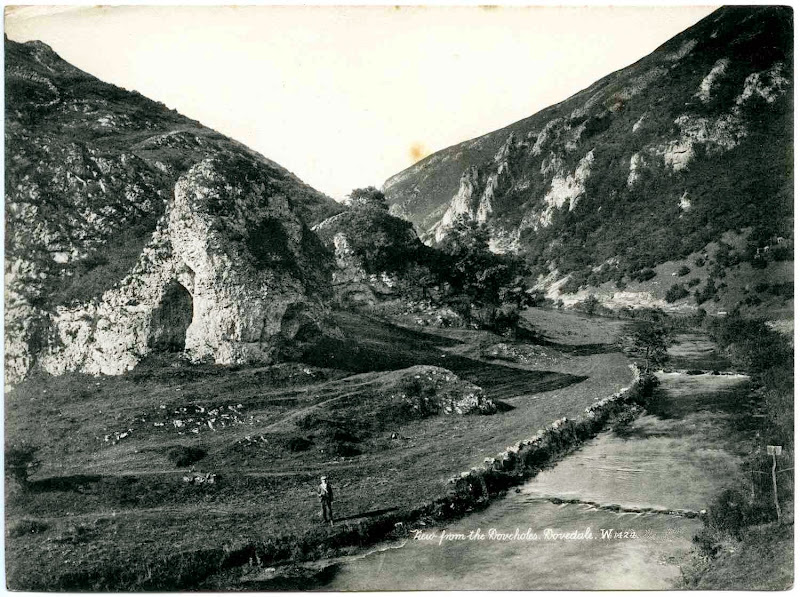
View from the Doveholes, Dovedale (Ref. W. 1424)
Original photograph publ. by James Valentine & Co.
Lithographic print publ. by Louis B. Twells, Ashbourne
This view of Dovedale from the mouth of the limestone cave known as Dove Holes is one of 16 prints of excellent quality which don't carry the name of either photographer or publisher. A detailed examination of the prints reveals artefacts suggesting that they were reproduced from carefully retouched photographic prints.

After some deliberation I've decided that the text so carefully pencilled out in this image included a negative number and the original publisher's initials:
1424 JV + Co. Ltdin the characteristic cursive script used by famous postcard publisher James Valentine & Co. of Dundee. However, I've yet to find an example of the original photograph published by Valentine.
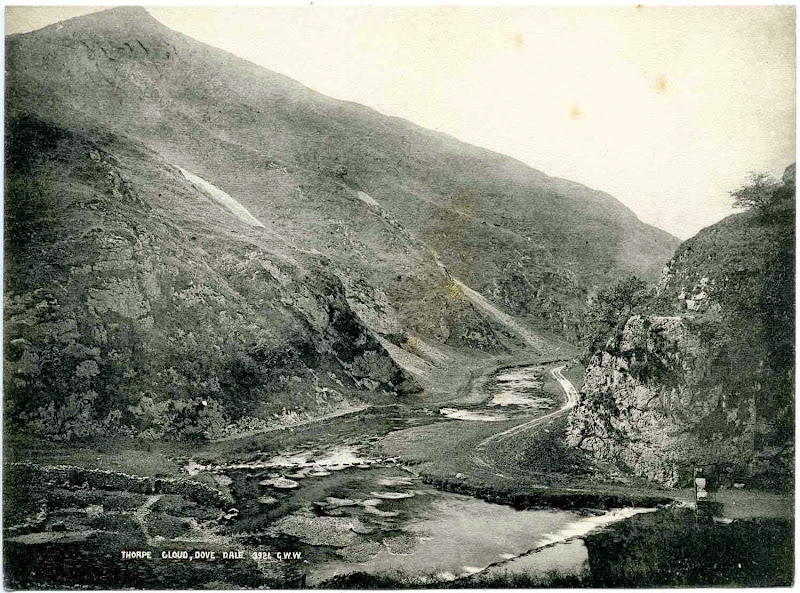
Thorpe Cloud, Dovedale (Ref. 3921)
Original photograph publ. by George Washington Wilson
A second group of 16 prints show similar landscapes. Although of slightly poorer reproduction quality, these views are still very professionally composed, and are annotated with the initials "G.W.W." This indicates that they were originally published by George Washington Wilson & Co. of Aberdeen, another Scottish photographer who became one of the largest publishers of photographic prints in the world, rivalling the business of Valentine and Sons.

In Dovedale Looking Up Entrance to Dale, (Ref. 3923)
Glass plate negative 220 x 170mm by G.W. Wilson & Co. of Aberdeen
Image © and courtesy of University of Aberdeen Library, Special Collections and Museums
The University of Aberdeen Library has an enormous collection of 45,000 of George Washington Wilson's glass plate negatives, the original photographs taken between 1853 and 1908, with digitized images online. There are 488 views of Derbyshire alone and the web site is well worth a visit. I wasn't able to find the same view, but I did find a similar one, with a negative number (3923) suggesting that it was probably taken on the same occasion.
Views of Ashbourne and Dovedale
Images © and collection of Brett Payne
The remaining views from the Ashbourne & Dovedale collection can be seen in this slideshow created with Picasa. It's difficult to know now if all 32 of the prints were originally sold in this wallet, or whether the G.W. Wilson prints were added later by a previous owner. However, from what I can tell, they appear to have been taken over roughly a decade from the mid-1880s through to the mid-1890s. Photographs mounted on glossy card of the particular shade of dark green used for the envelope were very popular in the 1890s, and I suspect that Louis Twells Junior was selling this collection at this time.

Unidentified group at Twelve Apostles' Rock, Dovedale, c.1900-1910
Lantern slide (83 x 83mm) by unknown photographer
Images © and collection of Brett Payne
My other purchase was a small group of lantern slides, almost certainly taken by an amateur, two of which depict an outdoor excursion by a small group of young men and women. Although not annotated, the view above is identifiable as the River Dove in the vicinity of Twelve Apostles' Rock, also shown in one of the prints by G.W. Wilson in the slideshow above.

Unidentified group, probably at Dovedale, c.1900-1910
Lantern slide (83 x 83mm) by unknown photographer
Images © and collection of Brett Payne
A second image shows three men and four women seated on a hillside, judging by the nature of the scree, probably the lower slopes of Thorpe Cloud or one of the adjacent hills flanking the entrance to Dovedale. If, as seems likely, the group consisted of four young couples, a fourth man is probably taking the photograph. One of the other slides in this small collection is dated 1906, and the clothing fashions of the women in the photo suggest that these are from a similar time period.

Magic Lantern Projector
Image © and courtesy of the Tauranga Heritage Collection
The second half of the nineteenth century saw a huge expansion in the number of people taking trips to the seaside and day excursions into the country. Pictorial mementos available to the everyday tourist included scenic images in the form of stereoscopic cards, carte de visites and unmounted prints published by both local firms and by larger enterprises such as Valentines and G.W. Wilson.
During the 1890s and early twentieth century advances in camera design and technology made them considerably cheaper and more portable. As a result, excursionists were able to create their own mementos as they enjoyed their holiday. These lantern slides were most likely produced by direct printing on thin glass slides from original glass-plate negatives, and would have been displayed with a magic lantern projector similar to that shown above.
References
Postcard Publishers, Printers, and Distributors of Note by the Metropolitan Postcard Club of New York City.
The George Washington Wilson and Co. Photographic Collection, University of Aberdeen Photographic Archive.
George Washington Wilson Collection online.
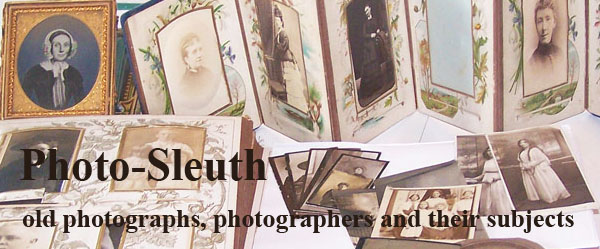
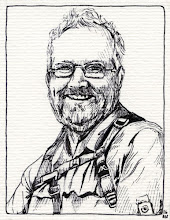






Lovely sceneries all around, especially Lady Cokayne's Avenue, in my opinion.
ReplyDeleteThat magic lantern is a gem!!
:)~
HUGZ
It almost looks like a steam locomotive, nd when it was operating would have had smoke from a candle issuing forth from the right hand side. Very steam punk, I think.
DeleteSteam punk is just what I was thinking. I like that green folder too.
DeleteAh Dovedale, scene of childhood family outings. I just found some slides amongst my dad's collection of us all there. That litel green book is wonderful.
ReplyDeleteI've not been there myself, although having researched and written about it so often now, I feel I know it pretty well. One day I'd like to visit and try to re-photograph the exact shots in the many scenes that I've accumulated.
DeleteMy favorite scene is the one of Twelve Apostles' Rock. Is that fog settling in or the quality of the picture? Either way, it reminds me of a landscape someone like John Constable or JMW Turner might have painted.
ReplyDeleteI'm note sure, Wendy, it could be either. Yes it does give it quite a sense of atmosphere. A pity that the quality - in terms of focus - is not great, as is so often the case with early amateur snapshots.
DeleteThat little green book is a great find. Enjoyed the slideshow immensely.
ReplyDeleteI've only recently discovered that you can create those slideshows very quickly and easily with Picasa, and will undoubtedly make more use of them in future.
DeleteYour posts are always inspirational! By the way, I've been reading with great enjoyment the Canadian Soldier's Diary from your link. My Dad enlisted in Winnipeg in December 1916 so I've gotten a much richer view of his experience from this diary.
ReplyDeleteThank you, Helen. I'm afraid I have neglected that blog (I presume you mean Grandpa's War). I had intended to resume it in time for the WW100 centenary celebrations, but time is slipping away quickly, and if I am going to do anything I will have to get to it soon.
DeleteWhat unit(s) did your father enlist and serve in, I wonder?
Number 4 section,(M,D,10) divisional ammunition column.
DeleteMy grandfather was with the C.A.S.C. for the first 18 months or so and they may well have crossed paths.
DeleteI certainly feel at home this week!! I am rather interested in the Prince Charles Door. I suspect it no longer exists, I have never heard of it, but I was always told of the Bonnie Prince's visit to Ashbourne, and indeed I have a crude trooper's cutlass allegedly left behind by the retreating troops. May I have a copy of the image? I am not sure if I can extract it from the slideshow.
ReplyDeleteOK>>>I managed to grab it online. I will look into it. There is not much of Ashbourne Hall left nowadays. Part of it is the library, part a restaurant. I will go and ask next time I am in ashbourne.
DeleteI thought you might be interested in the scenes with signs showing Wallis and Barnes family businesses, Nigel. Contact me by email if you want further scans.
DeleteI especially like the views that include people.
ReplyDeleteYes I agree Postcardy, but George Washington Wilson was renowned for producing views in which the people were not present, or at least insignificant.
DeleteAnother tour-de-force Brett. Such detailed histories of old photographers are quite fascinating, they provide such a perfect insight into the times they were recording.
ReplyDeleteThank you Alan. It's that relationship between photographer and subject that most interests me, and often the key to connecting the two lies in matching camera to photograph.
DeleteAS always, fascinating. This is my favourite part of Saturday morning, reading through the Sepia posts.
ReplyDeleteMine too. Thanks for visiting.
DeleteSimply distinctive charm and beauty in your post! Excellent photos too!
ReplyDeleteThank you Karen. Glad you could visit.
DeleteOh thanks so much for info about Picasa doing slide shows too. I'll have to try it. And if I were to be a time traveler back to the late 19th C. I'd invite you to come along for tidbits of photo information. Though I'd still like to have the digital technology handy for ease of collecting images!
ReplyDeleteIt would be a pleasure to come along for the ride.
DeleteBrett, one thing is for sure. Your posts keep me busy googling and checking out maps and such. So fortunate to have the internet --- almost makes up for not having seen these sites in person.
ReplyDeleteNone of this would be possible without the internet, and our lives would be a lot less rich, I think.
DeleteAnother great collection of photos. I also really enjoyed The Compleat Angler post and the wonderful pictures.
ReplyDeleteSo which one is your great grandfather?
I'm glad to hear you went had had a look at that one - my great-grandfather is standing at second from left.
DeleteI guessed the wrong one.
DeleteThat first lantern slide is beautiful. I would love to see that large through the projector. It's such a romantic and mysterious shot.
ReplyDeleteYou can see it a little large by clicking on the image, but I'm afraid it's not very well focussed, so enlarging it further doesn't produce very spectacular results. I agree, though, it's almost ethereal.
DeleteThat's a super collection and presentation, Brett. I've just returned from holiday in the UK which featured a driving tour up to the very top of Scotland. I'm now trying to sort all my photos of similar grand landscapes into a manageable album. I like how these photographers put a figure into the shot in order to give scale. Very artistic.
ReplyDeleteYes, even the amateur photographer taking the shots which eventually became lantern slides managed to give the landscapes some human interest and scale.
DeleteSounds like an interesting journey - all those narrow roads with passing bays that I remember well from a similar trip 25 years ago. We had lots of sunshine that trip - hope you did too.
Hi Brett,
ReplyDeleteThank you for your interesting blog. I have just discovered a book entitled 'Views of Ashburne & Dovedale. Published by C.Hales, Ashburne. At the back it mentions that it was photographed and printed by Valentine and Sons Ltd, Dundee. I'm intrigued by the spelling of 'Ashburne' rather than 'Ashbounre'. I find the photographs fascinating, especially as we were married at Ilam Hall a year and a half ago.
Hi Jessica. Glad you've enjoyed the blog.
DeleteDovedale and the surrounding area appears to be a popular spot for getting married - not surprising as it's so picturesque, and I hope you had a lovely day there.
I'd love to see scans of the James Valentine book if you would like to share them. Perhaps they could accoompany a follow up article on Dovedale that I'm planning, since I had a very pleasant walk down the length of it a few months ago.
I've seen several variants of the spelling, so it doesn't particularly surprise me.
Regards, Brett